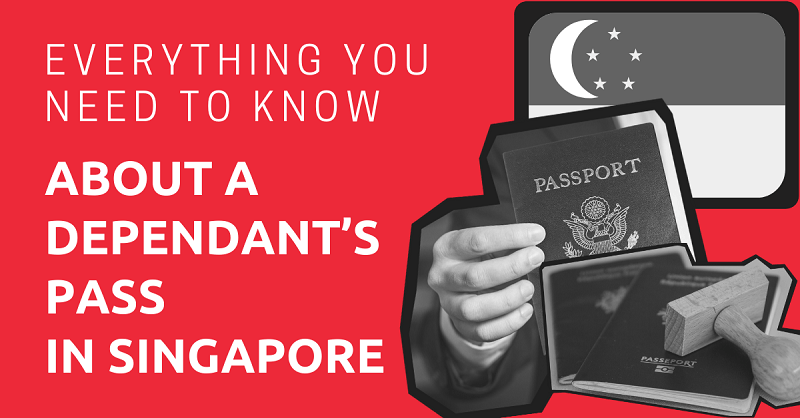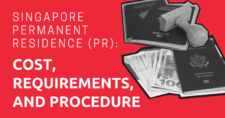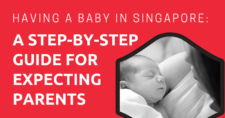
Many expats move to Singapore for work and fall in love with the culture and lifestyle. However, without their families, they may not want to stay long-term.
Thankfully, the Singaporean government allows foreigners with an Employment Pass, S Pass, or EntrePass to get a visa called a Dependant’s Pass for their spouse or children.
This guide offers comprehensive information about Singapore’s Dependant’s Pass to help you determine how to get one so your loved ones can join you in Singapore. The currency used throughout this guide is Singapore Dollars (SGD).
This article will take approximately 11 minutes to read. Don't have the time right now? No worries. You can email the ad-free version of the article to yourself and read it later!
Disclaimer: This article may include links to products or services offered by ExpatDen’s partners, which give us commissions when you click on them. Although this may influence how they appear in the text, we only recommend solutions that we would use in your situation. Read more in our Advertising Disclosure.
Contents
- Key Takeaways
- What is a Dependant’s Pass?
- Is a Dependant’s a Visa or a Work Permit?
- Who’s Eligible for a Dependant’s Pass?
- How to Apply for a Dependant’s Pass
- How Long Does It Take?
- What Happens if the Dependant’s Pass Application is Rejected?
- Does a Dependant’s Pass Need to be Renewed?
- What Happens if I Lose My Dependant’s Pass Card?
- Can I Work or Study in Singapore with a Dependant’s Pass?
- Can I Apply for Permanent Residence in Singapore?
- Do I Need to Cancel My Dependant’s Pass?
- Are There Other Types of Family Visas in Singapore?
Key Takeaways
- If you’re in Singapore on an Employment Pass, S Pass, or EntrePass, you can apply for a Dependant’s Pass to bring your spouse and/or children with you.
- Your family members cannot work or go to university on a Dependant’s Pass, but they can apply and interview for jobs.
- You can’t apply for a Dependant’s Pass on your family’s behalf; your employer has to do so for you.
- If your family members aren’t eligible for a Dependant’s Pass, they may meet the requirements for a Long-Term Visit Pass.
What is a Dependant’s Pass?
A Dependant’s Pass is a type of visa that the Ministry of Manpower (MOM) in Singapore issues to eligible family members of Employment Pass, S Pass, and EntrePass holders.
It allows the family members to enter and stay in Singapore for as long as the Employment Pass, EntrePass, or S Pass is active.
With a Dependant’s Pass, you can also travel outside the country and re-enter through a quicker lane without the need for an entry visa.
Is a Dependant’s a Visa or a Work Permit?
While a dependant’s Pass allows you to apply for jobs and attend interviews, you cannot legally work with one, so it’s not a work permit.
Who’s Eligible for a Dependant’s Pass?
Employment Pass or S Pass holders who earn over $6,000 a month from a well-established, Singapore-registered company can bring their legally married spouse or unmarried children under 21 to Singapore.
EntrePass holders have stricter requirements to bring their family members to Singapore. Their business must spend a minimum of $100,000 a year and have either three full-time employees or one local professional, manager, or executive employee.

EntrePass holders can also bring their parents to Singapore on a Long-Term Visit Pass, but only if their business spends a minimum of $200,000 a year and has either six full-time employees or two local professional, manager, or executive employees.
If you have an EntrePass and you’re not sure whether you’re eligible to bring your family members to Singapore, you can request an assessment of your eligibility with this form.
You’ll need to upload your company’s latest audited annual accounts and CPF statements showing payment to your employees for the past three months.
It can take up to eight weeks for the MOM to determine which (if any) pass your family members are eligible for, so try to submit your request as soon as possible.
How to Apply for a Dependant’s Pass
Like with an Employment Pass or S Pass, you can’t apply for a Dependant’s Pass yourself or on behalf of your family member; your employer must do it.
To complete the application for you or your family member, your employer may need copies of documents like a passport, marriage certificate, or birth certificate. For a full list of the required documents, check the Ministry of Manpower’s website.
The documents must be in English and if they’re not, you need to get them translated by a professional translator.
Once your employer has the required documents, they can apply for your family’s Dependant’s Pass manually or online after paying the $105 application fee for each pass. They may pay the fee for you or ask you to do so on your family’s behalf.
How Long Does It Take?
It typically takes three weeks to process the application, and if it’s approved, your family members will receive an In-Principle Approval letter. They must use this letter to enter Singapore within six months.
Once your family members are in Singapore, your employer can continue the application process for them. You or your employer need to pay another fee of $225 per pass for it to be issued.
When this application is approved, you and your employer will receive a notification letter by email, which allows your family members to travel in and out of the country while waiting for their physical card.
It also gives instructions for getting the card, which includes your family members having their fingerprints and photo taken.
The notification letter is valid for one month from the date of issue, so ensure your family members complete the necessary registration procedures before then. If you need more time, you can request to extend the validity of the notification letter here (for Employment Pass holders) or here (for S Pass holders).
After completing the registration process, your family members should receive their Dependant’s Pass card in the mail within four days.
What Happens if the Dependant’s Pass Application is Rejected?
If a Dependant’s Pass application is rejected, your employer can appeal the rejection. They must do so within three months of the rejection; otherwise, they have to start a new application.
Your employer can submit the appeal online and include any additional information or documents that may strengthen the application. If they don’t include any new information or documents, the appeal will be rejected.
It can take three weeks or more to process the appeal.
Does a Dependant’s Pass Need to be Renewed?
A Dependant’s Pass is valid for the same duration as the Employment Pass, EntrePass, or S Pass it’s tied to. This is typically one to two years. So, when your employer renews your pass, they can renew your family’s pass as well.
Your employer can renew it online up to six months before it expires, so if you notice your pass is expiring soon, don’t forget to notify your employer. You won’t lose the remaining time on your Dependant’s Pass if you apply early, the new pass will just start when your current one ends.
There’s a $225 fee per pass to renew your pass and your family’s Dependant’s Pass, which your employer may pay themselves or require you to do so.
Renewals aren’t guaranteed. The Ministry of Manpower thoroughly considers your application to ensure you and your family are still eligible for the passes.
If the renewal is approved, you and your family will receive a notification letter stating whether to continue using the same card or how to get a new card.
What Happens if I Lose My Dependant’s Pass Card?
If you lose your card or it’s stolen or damaged, the employer or main pass holder must apply for a replacement card online within a week.
There’s a $100 fee to replace the card the first time, then a $300 fee for subsequent losses, so try to be careful with it. If it was stolen, you also need to file a police report.
The Ministry of Manpower may interview you to discuss how you lost your card or how it was stolen before issuing another one.
If the request for a new card is approved, you should receive a card replacement letter by email. Once you have approval, you can collect your new card at the Employment Pass Services Centre four working days after the request is approved, you don’t need an appointment to do so.
Can I Work or Study in Singapore with a Dependant’s Pass?
Dependant Pass holders can apply for jobs, interview, and receive a job offer, but they cannot work without their own permit.

Prospective employers can apply for an S Pass or Employment Pass on behalf of the Dependant Pass holder. If the Dependant Pass holder receives their own work permit, they must cancel their Dependant’s Pass.
Children on a Dependant’s Pass can attend local or international K-12 schools. After this, they must apply for a student visa to pursue higher education.
Can I Apply for Permanent Residence in Singapore?
Renewing a Dependant’s Pass every few years can be tiring and expensive, so you may want to consider permanent residency if you’re interested in staying in Singapore long-term.
Your family members who are Employment Pass, EntrePass, and S Pass holders can apply for permanent residency for themselves and on your behalf. If their application is approved, yours will be as well.
Employment Pass and S Pass holders can apply for permanent residency immediately, but the longer they’ve been in Singapore, the better chance they have at getting their application approved.
The Immigration and Checkpoints Authority in Singapore handles permanent residency applications, so visit their website for more information about the procedure.
Do I Need to Cancel My Dependant’s Pass?
If the Employment Pass, EntrePass, or S Pass that the Dependant Pass is tied to is cancelled, the Dependant Pass will be cancelled as well. You may also need to cancel the pass for the following reasons:
- If the main pass holder has become a permanent resident
- If you decide to leave Singapore and reside elsewhere
- If you receive an Employment Pass or S Pass
The employer who originally applied for your Dependant’s Pass can cancel it for you. If you need extra time in the country to sort out your leaving plans or apply for a different visa, you can get a Short-Term Visit Pass in the meantime.
The Short-Term Visit Pass is typically valid for 30 days. You must leave the country within that time and show an immigration officer the pass upon your exit.
Are There Other Types of Family Visas in Singapore?
If you have an Employment Pass or S Pass and want to bring other family members to Singapore, you may be able to.
If you earn a minimum of $6,000 a month and work for an established, Singapore-registered company, you can get a Long-Term Visit Pass for the following family members:
- A common-law spouse
- Unmarried handicapped children above 21 years old
- Unmarried step-children under 21 years old
- Parents (If you earn a minimum monthly salary of $12,000)
Check the Ministry of Manpower’s website for any additional information about the Long-Term Visit Pass.






